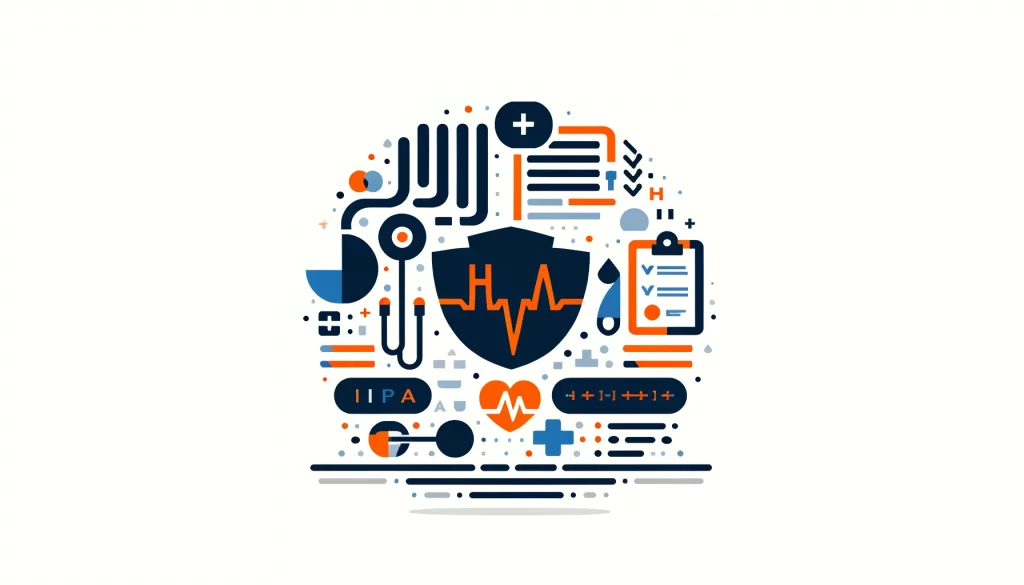
HIPAA: Health Insurance Portability and Accountability Act – Key Rules & Compliance

HIPAA, passed in 1996, is a key law in the US that protects patient privacy and data security. This federal law sets strict standards for the protection of sensitive patient information, known as protected health information (PHI).
Healthcare providers, health plans, and others must adhere to HIPAA rules for handling PHI – it’s not a choice, it’s a requirement. Failure to comply with HIPAA regulations can result in severe penalties, including hefty fines and even criminal charges.
The Scope of HIPAA
HIPAA rules apply to many healthcare organizations, like providers, plans, clearinghouses, and their business partners. Healthcare providers include a variety of professionals and organizations like doctors, nurses, hospitals, clinics, pharmacies, and nursing homes. Health plans include health insurance companies, HMOs, company health plans, and government programs like Medicare and Medicaid.
Healthcare clearinghouses convert nonstandard health information into a standard format, received from one entity, for processing by another entity. Business associates are people or companies that do certain tasks or services for a covered entity and can see PHI. Examples of business associates include third-party administrators, pharmacy benefit managers, claims processing services, and IT contractors.
Navigating the complex and ever-changing rules and regulations of HIPAA can be a daunting task for companies. Meeting HIPAA standards can be challenging for organizations. Organizations may find it difficult to meet HIPAA standards.
Challenges in Achieving HIPAA Compliance
One challenge is training employees on HIPAA requirements. Making sure all staff, from workers to executives, know their roles in protecting patient data is a difficult task. Organizations must develop comprehensive training programs that cover the various aspects of HIPAA, including the Privacy Rule, Security Rule, and Breach Notification Rule. Companies should customize programs for different employee groups and present them in an interesting and easy-to-understand way.
Another challenge is implementing security measures to protect PHI. This involves a multi-faceted approach that includes administrative, physical, and technical safeguards.
Administrative safeguards are policies and procedures designed to manage the selection, development, implementation, and maintenance of security measures. Physical safeguards are measures to protect electronic information systems and related buildings and equipment from natural and environmental hazards and unauthorized intrusion. Technical safeguards are tools and rules that protect electronic health information and control who can access it.
Additionally, organizations must keep detailed documentation of their compliance efforts. This includes maintaining written policies and procedures, conducting regular risk assessments, documenting employee training, and keeping records of any incidents or breaches. HIPAA requires keeping this documentation as important evidence in case of an audit or investigation.
Non-compliance with HIPAA can lead to a variety of problems for healthcare providers and other covered entities. Breaking patient privacy rules can harm a company’s reputation and trust with patients, leading to fines and legal costs. Data breaches and unauthorized access to PHI can harm patients, leading to identity theft and compromised medical care.
Following HIPAA rules can be difficult, but it is crucial for safeguarding patient information. It also helps in maintaining the efficiency of the healthcare system. Companies can avoid problems by following HIPAA rules, investing in resources and training, and protecting patient data.
HIPAA Regulations
HIPAA consists of several key components that work together to safeguard patient data. The Privacy Rule sets rules for protecting patient information. Healthcare providers must establish policies that restrict how they use and share patient information.
A hospital must get permission from the patient before sharing their medical records with a research institution or others. The hospital cannot share the records without the patient’s consent. The hospital requires the patient’s permission to share their medical information. The patient must give written consent before the hospital can share their medical records.
The Security Rule, on the other hand, focuses on the protection of electronic PHI (e-PHI). This rule requires measures to protect the privacy, integrity, and availability of electronic protected health information (e-PHI). An example of a technical safeguard is the use of encryption to protect patient data transmitted over the internet.
HIPAA requires companies to sign agreements with vendors or contractors who can see PHI. These agreements outline the responsibilities of the business associate in protecting patient data and complying with HIPAA regulations. A hospital hires a medical billing company to handle patient information in a contract.
Patients have rights under HIPAA, like accessing their health information, correcting mistakes, and knowing who has seen their information. Organizations must have processes in place to accommodate these patient requests in a timely manner.
Training and awareness are critical components of HIPAA compliance. Covered entities must provide regular training to their workforce on HIPAA regulations and best practices for protecting patient data. This can include online classes, workshops, and ongoing campaigns to remind people about the importance of privacy and security.
The Importance of Securing e-PHI
Following HIPAA rules to keep electronic health information safe is important, despite being challenging and costly. Healthcare providers store patient data online and share it in the digital age. This can increase the risk of unauthorized access, breaches, and misuse.
Securing e-PHI is crucial for several reasons. It is a matter of patient privacy and trust. Healthcare providers earn patients’ trust by keeping their private information confidential and secure. Any breach of this trust can have devastating consequences for both the patients and the organization involved.
Important to protect electronic patient information for good healthcare. Healthcare professionals need accurate patient information that is easy to access. This information is vital for making informed decisions and delivering appropriate care to patients. If healthcare providers don’t have secure access to e-PHI, it can cause delays in care and harm to patients.
Furthermore, the loss or inaccessibility of e-PHI can also impact the continuity of care for patients. When doctors can’t see a patient’s medical history or medications, it can cause mistakes in care. This can lead to problems in treatment. Patients may have to wait longer for treatments or medications, which can harm their health and well-being.
HIPAA Enforcement and Penalties
The HHS Office for Civil Rights enforces the HIPAA rules. OCR can investigate, fine, and report crimes to the Department of Justice.
OCR may initiate investigations based on complaints filed by individuals or through its own compliance reviews. If OCR finds a problem, it will try to solve it by following the rules, taking action, or making an agreement. If the covered entity does not take satisfactory steps to resolve the matter, OCR may impose civil monetary penalties.
The penalties for HIPAA violations can be severe. Penalties vary based on how careless the entity was. The lowest penalty is for violations the entity didn’t know about and couldn’t have prevented.
The highest penalty is given to intentional neglect that causes violations and isn’t fixed. Breaking the rules can result in penalties ranging from $100 to $50,000 per violation. The maximum penalty for the same violation is $1.5 million per year.
In addition to monetary penalties, covered entities may also face criminal charges for knowingly obtaining or disclosing individually identifiable health information. These charges can result in imprisonment.
Overall, protecting e-PHI is essential for maintaining the quality and safety of healthcare services. Healthcare organizations can protect patient data by using strong security measures. These measures keep electronic patient information safe and accessible. In addition, strong security measures can also help healthcare organizations provide better care to their patients.
The financial implications of failing to secure e-PHI are also significant. Healthcare data breaches are expensive, costing around $10 million per incident, making them one of the most costly breaches. This includes costs like legal fees, notifying patients, and credit monitoring. It also includes indirect costs like damage to reputation and loss of business.
The Future of HIPAA in the Digital Age
As technology advances, more healthcare providers are using electronic health records (EHRs) and other digital tools. This makes it harder to comply with HIPAA regulations. The use of mobile devices, cloud computing, and data analytics in healthcare is increasing. This growth brings new security risks and compliance concerns.
Healthcare organizations must keep current with new security technologies and best practices to tackle these challenges effectively. This could mean using better encryption tools, having stricter access controls, and doing security audits and risk assessments regularly.
Healthcare providers need to find a balance between patient access and engagement while following HIPAA rules. Patients are using patient portals and mobile apps to manage their health information. This means that healthcare providers must ensure that patients can access their information easily while also protecting their privacy.
Healthcare providers must follow HIPAA rules to safeguard patient information. This could involve creating new teaching guidelines for patients and obtaining their consent. It may also require implementing technology to prevent unauthorized access.
Conclusion
HIPAA compliance is a complex and ongoing challenge for organizations in the healthcare industry. Complying with regulations can be difficult because of complex rules, implementation challenges, and high costs.
Organizations can earn patients’ trust by keeping their information safe and following HIPAA regulations with proper resources and knowledge. This includes fostering collaboration between compliance teams and data management personnel, streamlining access controls and security measures, and providing ongoing training and awareness programs.
Healthcare organizations must ensure HIPAA compliance to protect and keep patient information confidential. By investing time and resources into maintaining compliance, organizations can demonstrate their commitment to safeguarding sensitive data. This builds trust with patients and lowers the risk of expensive data breaches and legal issues.
Staying vigilant and regularly updating compliance strategies is essential in today’s rapidly changing digital landscape. With advancements in technology and the increasing sophistication of cyber threats, healthcare organizations must adapt their security measures to meet evolving data security requirements.
This means using strong security measures. It also involves checking for risks often. Additionally, training staff regularly is necessary to keep them up to date on security measures.
Ultimately, the benefits of HIPAA compliance far outweigh the costs. Healthcare organizations should prioritize data security and privacy to protect their reputation, avoid penalties, and keep patients safe. Following HIPAA rules is important to protect patient information in today’s digital world. This is essential for keeping data safe and private.
